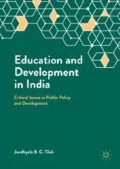Abstract
The literature on economics of education has considered only two domains, individual and social, in the context of investment decision-making. But there are three distinct domains, namely, individual (household domain), market domain, and public (social) domain. Investment decision-making in these three domains is influenced by three different sets of considerations, and therefore, they need to be separately analysed, recognising, however, the interrelationship between them. This chapter, the 2003 Dr. Adiseshiah memorial lecture, analyses, accordingly, the three closely related aspects of financing education in India: the increasing reluctance of the government to spend on education, the phenomenon of compulsion to pay for education by the families, which is familiarly known, but not correctly termed, as ‘willingness to pay for education’ and the role the unregulated and unscrupulous markets play in education.
Published in Review of Development and Change 8 (2) (July–December 2003): 115–44 © Madras Institute of Development Studies.
Access this chapter
Tax calculation will be finalised at checkout
Purchases are for personal use only
References
AICTE. 1994. Report of the High Power Committee for Mobilization of Additional Resources for Technical Education (Dr. Swaminadhan Committee Report). New Delhi, All India Council for Technical Education.
Arrow, Kenneth J. 1973. Higher Education as a Filter. Journal of Public Economics 2 (3): 193–216.
Behrman, J.R. 1990. Human Resource Led Development? Review of Issues and Evidence. New Delhi: ILO-ARTEP.
Colclough, C. 1993. Education and the Market: Which Parts of the Neo Liberal Solution are Correct? Innocenti Occasional Papers, Economic Policy Series No. 37. Florence, IT: UNICEF.
Deshpande, J.V. 1991. Boom in Teaching Shops. Economic and Political Weekly 26 (30) (27 July): 1787.
Drèze, Jean, and Amartya Sen. 2002. India: Development and Participation. Delhi: Oxford University Press.
Education (Kothari) Commission. 1966. Education and Development. New Delhi: Government of India, Ministry of Education.
Kothari, V.N. 1986. Private Unaided Engineering and Medical Colleges: Consequences of Misguided Policy. Economic and Political Weekly 21 (14) (5 April): 593–96.
Majumdar, Tapas. 1983. Investment in Education and Social Choice. Cambridge: Cambridge University Press.
Neave, Guy. 1996. Higher Education in Transition: Twenty Five Years On. Higher Education Management 8 (3) (November): 15–24.
Prime Minister’s Council on Trade and Industry. 2000. A Policy Framework for Reforms in Education. A Report Submitted by Special Subject Group on Policy Framework for Private Investment in Education, Health and Rural Development. New Delhi: Government of India [Mukesh Ambani-Kumaramanglalam Birla Report]. http://www.nic.in/pmcouncils/reports/education.
Schultz, Theodore W. 1961. Investment in Human Capital. American Economic Review 51 (1) (March): 1–17.
Spence, A.M. 1973. Job-Market Signalling. Quarterly Journal of Economics 87 (3) (August): 355–374.
Stiglitz, Joseph. 2002. Globalization and Its Discontents. London: Allen Lane and Penguin.
Tilak, J.B.G. 1989. Center-State Relations in Financing Education in India. Comparative Educational Review 33 (4) (November): 450–480.
Tilak, J.B.G. 1991. Privatization of Higher Education. Prospects: Quarterly Review of Education (UNESCO) 21 (2): 227–239.
Tilak, J.B.G. 1994. South Asian Perspectives (on Alternative Policies for the Finance, Control, and Delivery of Basic Education). International Journal of Educational Research 21 (8): 791–798.
Tilak, J.B.G. 1996a. How Free is ‘Free’ Primary Education in India? Economic and Political Weekly 31 (5 and 6) (3 and 10 February): 275–282, 355–366.
Tilak, J.B.G. 1996b. Higher Education Under Structural Adjustment. Journal of Indian School of Political Economy 8 (2) (April–June): 266–293.
Tilak, J.B.G. 1997. Lessons from Cost Recovery in Education. In Marektising Education and Health in Developing Countries: Miracle or Mirage? ed. C. Colclough, 63–89. Oxford: Clarendon Press.
Tilak, J.B.G. 1999a. National Human Development Initiative: Education in the Union Budget. Economic and Political Weekly 34 (10–11) (6 March): 614–620.
Tilak, J.B.G. 1999b. Investment in Human Capital in India: An Inter-State Analysis of Stock and Flow of Human Capital. Journal of Indian School of Political Economy 11 (January–March): 39–75.
Tilak, J.B.G. 1999c. Emerging Trends and Evolving Public Policies on Privatisation of Higher Education in India. In Private Prometheus: Private Higher Education and Development in the 21st Century, ed. P.G. Altbach, 113–135. Westport: Greenwood Publishing.
Tilak, J.B.G. 2000. Household Expenditure on Education in India: A Preliminary Examination of the 52nd Round of the National Sample Survey. New Delhi: National Institute of Educational Planning and Administration.
Tilak, J.B.G. 2002a. Determinants of Household Expenditure on Education in Rural India. Working Paper No. 88, National Council of Applied Economic Research, New Delhi.
Tilak, J.B.G. 2002b. Education Poverty in India. Review of Development and Change 7 (1) (January–June): 1–44.
UGC. 1993. UGC Funding of Institutions of Higher Education. Report of Justice Dr. K. Punnayya Committee, 1992–92. New Delhi: University Grants Commission.
UNDP. 2003. Human Development Report. New York: Oxford University Press.
World Bank. 2003. World Development Report. New York: Oxford University Press.
Acknowledgements
Dr. Malcom Adeiseshiah Memorial lecture delivered on 21 November 2003 at the Madras Institute of Development Studies, Chennai. Grateful acknowledgements are due to V. K. Natraj, C. T. Kurrien, A. M. Nalla Gounden, A. Vaidyanathan, V. Loganathan, M. Anandakrishnan and others for their valuable observations.
Author information
Authors and Affiliations
Rights and permissions
Copyright information
© 2018 The Author(s)
About this chapter
Cite this chapter
Tilak, J.B.G. (2018). State, Households and Markets in Education: Government’s Unwillingness and Households’ Compulsion to Pay for Education vis-à-vis the Exploitative Markets. In: Education and Development in India. Palgrave Macmillan, Singapore. https://doi.org/10.1007/978-981-13-0250-3_12
Download citation
DOI: https://doi.org/10.1007/978-981-13-0250-3_12
Published:
Publisher Name: Palgrave Macmillan, Singapore
Print ISBN: 978-981-13-0249-7
Online ISBN: 978-981-13-0250-3
eBook Packages: EducationEducation (R0)

